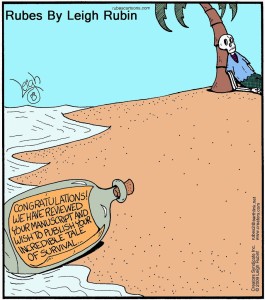 When a writer pours their heart and soul into a book, the last thing they expect is a 1-star review. Negative feedback can significantly impact book sales, especially these days where many readers rely on reviews to decide what to read next.
When a writer pours their heart and soul into a book, the last thing they expect is a 1-star review. Negative feedback can significantly impact book sales, especially these days where many readers rely on reviews to decide what to read next.
It’s disheartening to accept months of hard work, dedication, and passion dismissed in a few harsh words. Authors may experience a range of emotions, from disappointment to anger, but most don’t lash out at the reviewer.
My original plan for this article began with one severe case of an author physically attacking a reviewer over a 1-star review of his unedited debut. I’m now sickened by the number of authors who engage in this type of behavior, including one who called the reviewer a b*tch in a BookTok video for a 4-star review of her upcoming novel (ARC copy). Shortly thereafter, the publisher dumped her. But thanks to all the viral videos about the controversy, her book has allegedly been optioned for film. If it pans out, I’ll share the title. Otherwise, no. For all I know, the author lied about the option to gain exposure.
Who complains about a 4-star review?
Anyway, the original case that prompted this topic revolves around a 28-year-old writer named Richard Brittain.
In 2014, Brittain self-published his unedited debut novella. Like every new author, I’m sure he expected the entire world would love his “epic fairytale romance.” When an 18-year-old student named Paige Rolland read his work, she was less than impressed.
Not only was the book riddled with “spelling and grammatical errors,” “endless ramblings,” and the “plot [was] rather nonsensical,” according to other reviewers, but…
“There’s a very unpleasant subtext to the novel that only comes through if you’ve read the author’s blog post about stalking a woman until she called the police in terror. It’s creepily clear that the princess/protagonist stands for either the woman he stalked or women in general, and that her loyal dog likewise represents him or ‘nice-guy’ stalkers.”
Seething with anger over Paige’s 1-star review of his book, Brittain looked her up on Facebook. Paige’s profile included her hometown and her place of employment (How much personal information do you share?). Brittain embarked on the 400-mile journey to Scotland to track down the teenager.
On October 3, 2014, Brittain proceeded to the supermarket where Paige was working that day. Intent on revenge, he grabbed a bottle of wine from the alcohol section and stalked into the cereal aisle, where Paige was restocking the lower shelves. Enraged, he slammed her over the head with the bottle. The petite teenager suffered a horrific head injury—a gaping wound to her skull.
Emergency services responded to rush her to the hospital. By then, Brittain had fled the scene. It didn’t take long for police to track him down in London. A search of his home revealed travel documents and evidence of his obsession with finding the girl who dared to criticize his work. Charged with assault, Brittain received a 30-month jail sentence.
How AI Thinks We Should Handle Negative Reviews (my comments are in blue)
- Respond to every review: Responding to all reviews, both positive and negative, shows you care about your customers and are willing to apologize when necessary. (What? Not even close to correct. NEVER respond to negative reviews. Curse, cry, or scream, but do not interact with the reviewer.)
- Apologize: Apologize when responding to a negative review, even if the customer’s tone was hostile. (Huh? Reviews are one reader’s opinion. Not everyone will like our work, and that’s okay. Grow a thick skin and move on with your life.)
- Ask for an updated review: If you’ve responded to the customer’s review and solved the problem, you can ask for an updated review. (This sounds more like a shipping issue on a random product than a book review. NEVER ask for an updated review.)
- Contact the reviewer and request the review be removed: It’s always worth the effort to contact the person who left the review. They can remove the review by logging back into the site and deleting it. (This might be the worst advice of all. NEVER contact the reader and ask them to delete the review. Ever.)
- Thank the reviewer: Show gratitude for their time and show that you value their feedback. (I know authors who do this. They’re polite and grateful. Still, I never respond to reviews, good or bad. Reviews aren’t for authors. They’re for other readers.)
- Never get personal: Don’t get personal and certainly don’t ever attack or retaliate. (Finally, a logical point I agree with!)
Well, TKZers, how do you deal with negative reviews?
Do the AI suggestions surprise you? Unfortunately, new writers may believe the advice.
Do you think Richard Brittain should have gotten more jail time?






